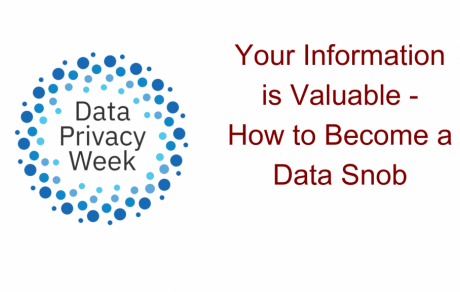Your Information is Valuable–How to Become a Data Snob

We generate a lot of data every time we access the internet. This data ranges from your interests and purchases to your online behaviors, and it is collected by websites, apps, devices, services, and companies all around the globe. Safeguarding our data has become paramount to our life in the digital landscape. In honor of Data Privacy Week & Day, we are excited to bring attention to the importance of data privacy and share insights on how we can collectively protect our sensitive information.
Why Data Privacy Matters
According to the Identity Theft Resource Center (ITRC), at the end of Q3 2023, there had been 2,116 data breaches that had 233,935,731 victims so far just in 2023! The top offenders were financial services, healthcare, professional services, manufacturing, and education.
Data breaches leave victims open to a variety of identity theft and other crimes:
- Fraudulent credit card charges/bank account compromises/tax return filings
- Hacked accounts (e.g., email, social media)
- Unauthorized applications for loans and lines of credit
What Information Should I Protect?
The most important information you should keep private is called personally identifiable information (PII). PII is defined by the National Institute of Standards and Technology as, “any representation of information that permits the identity of an individual to whom the information applies to be reasonably inferred by either direct or indirect means.” This information can be used to “distinguish or trace an individual’s identity” and includes “any information that is linked or linkable to an individual such as medical, educational, financial, and employment records.”
Examples of PII include:
- Name–Full name, mother’s maiden name, your maiden name
- Social Security numbers and other numbers such as a taxpayer ID number, credit card numbers, driver’s license numbers, passport numbers, bank account numbers, and patient ID numbers
- Date and place of birth
- Addresses–current and previous
- Phone Numbers–current and previous
- Vehicle ID or title numbers
- Biometric records–retina and iris scans, fingerprints, voiceprints, DNA sequence, handwriting, or facial geometry
- Network device information including hardware MAC address and public internet addresses (IP address)
Key Principles for Data Privacy:
- User Control: Understand the importance of controlling access to your personal information. Utilize privacy settings on various platforms to tailor who can view your data. Understand the tradeoff between privacy and convenience.
- Secure Password Practices: Strengthen your digital fortress by using complex passwords and updating them regularly and NEVER reuse old passwords. Enable two-factor authentication/muti-factor authentication whenever possible for an added layer of security.
- Data Encryption: Embrace the power of encryption to protect your messages and files. Encryption ensures that even if data is intercepted, it remains unreadable without the appropriate decryption key.
- Staying Informed: Keep yourself informed about the latest trends and threats in the digital space. Awareness is the first line of defense against potential risks.
Take Action Today:
- Review Your Privacy Settings: Conduct a comprehensive review of your privacy settings on university and personal accounts. This page from the National Cybersecurity Alliance will help you with some of the larger sites: Manage Your Privacy Settings - National Cybersecurity Alliance (staysafeonline.org)
- Check Your Settings: Look at each app’s settings on your devices. Some things you should turn off unless you (1) need it on for the app to function AND (2) you trust the app are the camera, microphone, location, and sync of your contacts.
- Cultivate a Data Privacy Habit: Apps, websites, devices, and software will often seek out more data than you would think necessary. For example, why does a social media app need to know the phone numbers of everyone you know? Think about what you’re asked to share and why. Then, do you want to? Yes, if you’re using Google Maps, it probably will need to know your location…but does that Solitaire game need to know your location?
- Delete apps you don’t use. If you haven’t used the app in months, delete it. Be ruthless. Most of the time you can always download the app again.
- Educate Others: Share your knowledge with peers, fostering a community of digital guardians committed to data privacy.
- Stay Connected: Join the conversation on social media using the hashtag #DataPrivacyWeek2024. Share tips, resources, and experiences with the wider university community.
Together, we can cultivate a culture of data privacy that extends beyond this week, creating a resilient and secure digital environment for everyone. Let's make Data Privacy Week/Day not just a week of awareness but a catalyst for lasting change.
Stay secure, stay empowered!